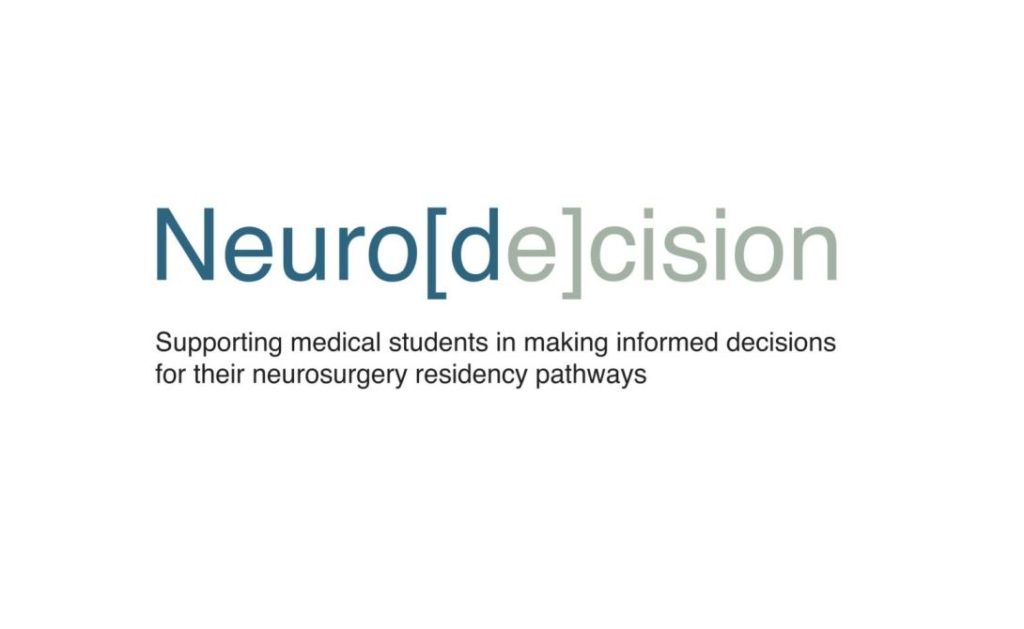Neurodecision: supporting medical students in making informed decisions for their neurosurgery residency pathways
Neurodecision is a 2-year Cooperation Partnership project funded by Erasmus+,
that Humanitas University is leading in collaboration with:
- International Neuroscience Institute – Hannover, Germany
- Univerzitet u Beogradu – Beograd, Serbia
- Lusiadas Hospital Porto – Porto, Portugal
The project started on October 2022 and will end by the end of September 2024.
Its objective is to design an innovative training course for medical students at the 5th/6th years.
The proposal is a joint collaboration of academic and research partners in the area of medical teaching with a strong focus on responding to a common problem and challenge: high rate of dropouts at the 1st year of the residency programme in neurosurgery. Being aware of this issue, the partners’ motivation is associated with the fact that the current collaboration could be extended to the design of a common solution (for a common problem) that can prepare better the medical students to embrace their post-graduate residencies and to facilitate their decision-making process.
To reach these objectives, an innovative international training course will be co-designed with user’s representatives and tested in a pilot action where the partners will jointly promote and deliver (Promoting inter-connected higher education systems) the course to 5th/6th-year medical students across Europe.
The ultimate goal of this course is to promote, during the medical studies, specific training to 5th/6th-year students in Neurosurgery and neuroanatomy so they can choose a post-graduate education more thoughtfully. Students will be exposed to the most advanced technology training tools outside and inside the operating theatre, and they will have the opportunity to see from the spot what is the real workload of a neurosurgeon, which skills are required, what tools are used, etc.

Goals
The objectives of the project are to:
The main features of the course (Addressing digital transformation and Stimulating innovative learning and teaching practices) are:
Outcomes
The Neurodecision project has had a significant and lasting impact on the way medical students across Europe perceive and prepare for a potential career in neurosurgery. Through a carefully designed sequence of five experiential learning modules, participants were immersed in the multifaceted realities of the neurosurgical profession. From operating room simulations that placed them in urgent decision-making scenarios, to cadaver-based workshops where they gained hands-on anatomical experience, students were challenged to engage not just with technical skills, but with the emotional and ethical dimensions of the specialty.
A summer of guided reflection through literature and film invited honest self-assessment, while a series of expert-led lectures across four countries helped build a strong theoretical foundation. The two-week mobility program – arguably the capstone experience – offered unparalleled clinical immersion and mentorship within leading European neurosurgical centers. Across all activities, students reported a deeper understanding of the lifestyle, pressures, and responsibilities inherent to the field. Quantitative assessments showed statistically significant improvements in knowledge, while qualitative feedback highlighted increased confidence, motivation, and clarity of purpose.
Many participants described their experiences as transformative – some confirming their aspirations to pursue neurosurgery, others redirecting their paths with informed conviction. In both cases, the project succeeded in its core aim: supporting students in making thoughtful, well-informed career decisions. By emphasising realistic exposure, critical reflection, and early mentorship, Neurodecision not only enriched medical education but laid the groundwork for more resilient, better-prepared future neurosurgeons.
Dissemination
The Neurodecision project will soon be showcased at several major international neurosurgical congresses, marking an important milestone in sharing its innovative educational model and measurable impact with the global neurosurgical community.
This autumn, the project will be presented at the 2025 Annual Meeting of the European Association of Neurosurgical Societies (EANS) in Vienna. The session, titled “Brainwave: A Multi-Center European Simulation Initiative to Enhance Neurosurgical Training and Reduce Residency Dropout Rates,” will introduce attendees to our high-fidelity simulation experience implemented across four leading European institutions. The presentation will focus on how immersive clinical decision-making exercises have helped medical students clarify their career goals and better prepare for the demands of neurosurgical training.
In December 2025, Neurodecision will also take center stage at the 19th World Congress of Neurosurgery (WFNS 2025), hosted by the World Federation of Neurosurgical Societies in Dubai. Three distinct presentations are scheduled:
- “Clearing the Fog: Multimedia Immersion Preparing Medical Students for Neurosurgical Career Realities” will describe our innovative self-paced reflection module that uses literature and film to highlight the psychological and lifestyle challenges of a neurosurgical career.
- “Beyond the Books: Revolutionizing Neurosurgical Training Through Hands-on Cadaver Simulation” will present data from our hybrid cadaver workshop, emphasizing knowledge gains and student feedback on the value of hands-on, low-stress surgical practice.
- “Neurodecision: A Comprehensive European Initiative to Enhance Neurosurgical Training and Reduce Residency Dropout Rates” will serve as a capstone presentation summarizing the multi-modal structure and longitudinal results of the entire project, including improvements in technical knowledge, emotional preparedness, and mentorship engagement.
Additionally, Neurodecision will be featured at the upcoming Annual Congress of the Serbian Neurosurgical Society, where collaborators from the University of Belgrade and the University Clinical Center of Serbia will present the local implementation of the project. Their session will explore student experiences during the two-week clinical mobility program and reflect on the program’s influence on motivation, career clarity, and team integration.
These upcoming congresses will offer invaluable opportunities to disseminate Neurodecision’s findings, engage with international educators and neurosurgeons, and advocate for early, realistic, and human-centered neurosurgical preparation as a means of improving long-term trainee success.
